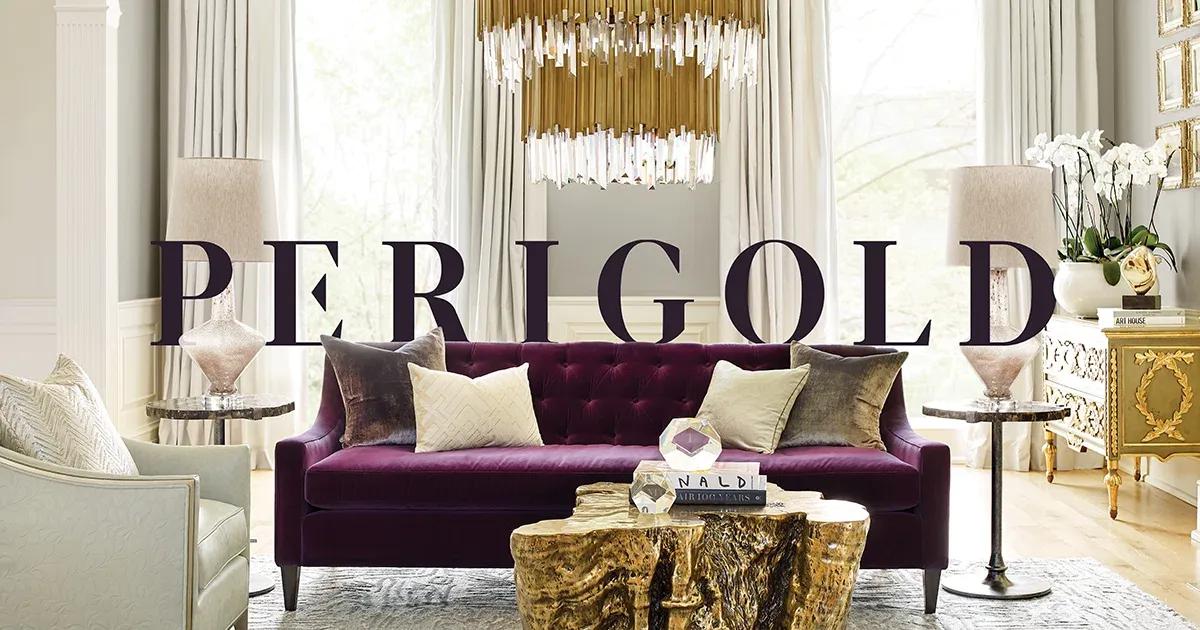The Origin of Perigold: Wayfair’s Gamble on Luxury
Perigold, launched by Wayfair in 2017, aims to rebrand the company’s budget image by offering luxury home furnishings online. Despite challenges in selling high-end goods digitally, Perigold continues to expand, bridging the gap between trade exclusivity and consumer access.

Wayfair has long been synonymous with affordable home goods, a reputation that has served the company well in the competitive e-commerce space. However, as Wayfair solidified its standing as a budget-friendly retailer, it struggled to shake off the perception that it was solely a destination for cost-conscious consumers. Despite its massive growth and dominance in the online home furnishings market, Wayfair found itself pigeonholed as a budget brand, limiting its ability to make significant inroads into the lucrative luxury market.
Recognizing this challenge, Wayfair's co-founders, Niraj Shah and Steve Conine, launched Perigold in 2017, aiming to break free from the budget label and establish a foothold in the high-end furniture and decor sector. This article explores the origins of Perigold, its growth, and the challenges it faces as it seeks to redefine Wayfair’s place in the luxury e-commerce landscape.
The Genesis of Perigold: A Strategic Pivot for Wayfair
In 2017, Niraj Shah and Steve Conine, the co-founders of Wayfair, decided to launch Perigold as a distinct platform within their growing empire. The goal was clear: to tap into the lucrative luxury market by offering an online destination where customers could access high-end brands that were previously difficult to find outside of exclusive showrooms.
Perigold was designed to cater to a discerning clientele, bringing together a collection of prestigious brands like Schumacher, Frette, and Milling Road. With over 75,000 SKUs at launch, the platform aimed to make it easier for consumers to discover and purchase luxury furnishings—products that, until then, were often reserved for trade professionals or those willing to navigate the boutique retail landscape.
Rebecca Ginns, Perigold’s brand director, articulated the platform’s mission: "For anyone who is excited to find the best pieces for home, Perigold brings top home brands together all in one place for the first time." This was not just about convenience; it was about breaking down barriers in the luxury market, making high-end design more accessible to a broader audience.
Perigold’s Growth: A Measured Success
Since its inception, Perigold has grown quietly but steadily, now boasting nearly 1,000 brands and employing around 150 people. While Wayfair does not disclose Perigold’s earnings separately, the platform’s expansion suggests it has established a firm foothold in the luxury e-commerce space.
Perigold’s appeal extends beyond the general consumer; it has also attracted a significant number of trade professionals. Trade accounts reportedly make up between 10 and 30 percent of Perigold’s user base, highlighting the platform’s dual purpose. However, this broad accessibility has not come without criticism. Some interior designers have voiced concerns that Perigold’s offerings blur the lines between trade-exclusive products and consumer goods, potentially undermining the exclusivity that once defined luxury retail.
Navigating the Luxury E-Commerce Challenge
One of the critical challenges Perigold faces is effectively conveying the value of high-end products through an online platform. As Rebecca Ginns pointed out, "When you’re selling online, you can put a $1,000 sofa, merchandised really well, next to a $10,000 sofa, merchandised really poorly. And it’s really hard for the customer to discern why they should be spending $10,000."
This issue is emblematic of a broader challenge in selling luxury goods online. Unlike physical showrooms, where customers can see, touch, and experience the quality of a product, online platforms must rely on imagery and descriptions to convey value. For Perigold, the task is to bridge this gap, helping customers understand the craftsmanship, materials, and design expertise that justify higher price points.
Strategic Hires and Content Development
In 2022, Perigold made significant strategic hires to strengthen its brand and content strategy. Nancy Soriano, with a background in publishing and branding, joined as head of editorial, while Amelia White, formerly of Flos, became head of modern. These hires reflect Perigold’s commitment to enhancing its narrative around luxury products and expanding its market reach.
Soriano emphasized the importance of storytelling in helping consumers appreciate what makes a brand or product truly premium. "There’s a lot of opportunity to make those connections—from designers to consumers, from consumers to brands—to understand what makes a brand premium beyond just the name recognition," Soriano noted. This approach aligns with Perigold’s broader mission to educate customers about the unique qualities of the products it offers.

Balancing Trade and Consumer Access
Perigold has had to navigate the delicate balance between serving trade professionals and reaching a wider consumer audience. As more brands explore direct-to-consumer sales, Perigold has become a key platform for these brands to test e-commerce without alienating their trade partners. This strategy, however, has led to some tension within the design community, where exclusivity is highly valued.
Amelia White pointed out the need for brands to be "channel agnostic," allowing customers—whether they are trade professionals or consumers—to engage with brands in the way that suits them best. This flexibility is crucial in a market where the distinctions between trade and consumer sales are increasingly blurred.
Supporting Heritage Brands in the Digital Age
Perigold has also taken on the challenge of helping heritage brands transition to the digital marketplace. Many of these brands, which have long relied on physical showrooms and traditional retail methods, have struggled to adapt to the demands of e-commerce. Perigold has invested in resources to assist these brands, from organizing digital assets to managing supply chains.
As Ginns acknowledged, many of these suppliers still operate with paper-based records, making the transition to an online platform complex. Perigold has stepped in to support these brands, ensuring that their products are accessible to a wider audience while maintaining the integrity and quality that define luxury goods.
Looking Forward: Perigold’s Path Ahead
As Perigold continues to evolve, it faces both opportunities and challenges. The platform is expanding its brand offerings, exploring new categories like large appliances and modern design brands. However, it must also contend with ongoing supply chain issues and the challenge of maintaining its luxury image in a competitive market.
Nancy Soriano and Amelia White both emphasized the importance of growing Perigold’s visibility and helping consumers discover the world of luxury design. Success for Perigold will involve not only expanding its brand portfolio but also deepening its connections with both trade professionals and consumers.
Conclusion: Perigold’s Unique Role in Luxury E-Commerce
Perigold’s journey from a niche experiment within Wayfair to a significant player in the luxury e-commerce market underscores the platform’s innovative approach and strategic growth. By making high-end design accessible to a broader audience while maintaining the quality and exclusivity that define luxury, Perigold has carved out a unique space in the market.
As it continues to grow and evolve, Perigold remains focused on its mission: to help consumers and trade professionals alike discover and appreciate the best in luxury design. Whether you’re an interior designer seeking exclusive pieces or a consumer looking to invest in high-quality furnishings, Perigold offers a unique shopping experience that blends the convenience of e-commerce with the prestige of luxury brands.

Geoff Abraham
Co-founder & President of Spoken
Geoff is the co-founder and President of Spoken. He is a Dad. He holds a BA from UT Austin (Plan II) and an MBA from Stanford. Geoff has built several successful businesses, including a bicycle taxi business in San Francisco which he ran for 10 years with his wife, Mimosa. He is an executive coach, and he actively invests in seed-stage startups via The Explorer Fund.
Read more